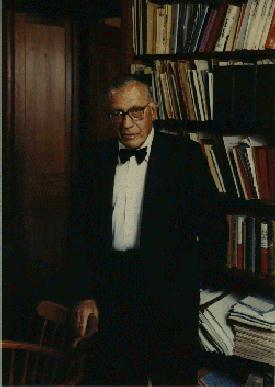Difference between revisions of "John Dunlop"
m (Text replacement - "|twitter= " to "") |
(unstub) |
||
| (3 intermediate revisions by one other user not shown) | |||
| Line 1: | Line 1: | ||
{{person | {{person | ||
|wikipedia=https://en.wikipedia.org/wiki/John_Thomas_Dunlop | |wikipedia=https://en.wikipedia.org/wiki/John_Thomas_Dunlop | ||
| − | | | + | |description= US Secretary of Labor. Dean of the Faculty of Arts and Sciences at Harvard when attending [[1971 Bilderberg]] |
| − | |image= | + | |image=John Dunlop.jpg |
| − | |nationality= | + | |nationality=American |
|birth_date=1914-07-05 | |birth_date=1914-07-05 | ||
|birth_place=Placerville, California, United States | |birth_place=Placerville, California, United States | ||
| Line 11: | Line 11: | ||
|interests=labor relations | |interests=labor relations | ||
|spouses=Dorothy Webb Dunlop | |spouses=Dorothy Webb Dunlop | ||
| − | |alma_mater=University of California | + | |alma_mater=University of California (Berkeley) |
|political_parties=Independent | |political_parties=Independent | ||
| − | |children=John Barret Dunlop Beverly Clarie Dunlop, Thomas Frederick Dunlop | + | |children=John Barret Dunlop, Beverly Clarie Dunlop, Thomas Frederick Dunlop |
|parents=John W. Dunlop Antonia D. Forni | |parents=John W. Dunlop Antonia D. Forni | ||
|employment={{job | |employment={{job | ||
| − | |title= | + | |title=US Secretary of Labor |
|start=March 18, 1975 | |start=March 18, 1975 | ||
|end=January 31, 1976 | |end=January 31, 1976 | ||
}} | }} | ||
}} | }} | ||
| − | '''John | + | ''Not to be confused with [[John B. Dunlop]], his son''. |
| + | |||
| + | '''John Thomas Dunlop''' was [[US Secretary of Labor]], labor economist, and educator. Dunlop was the [[United States Secretary of Labor]] between 1975 and 1976 under President [[Gerald Ford]]. He was Director of the United States Cost of Living Council from 1973 to 1974, Chairman of the United States Commission on the Future of Worker-Management Relations from 1993 to 1995, which produced the [[Dunlop Report]] in 1994. He was also arbitrator and impartial chairman of various United States labor-management committees, and a member of numerous government boards on industrial relations disputes and economic stabilization. | ||
| + | |||
| + | Dunlop taught at [[Harvard University]] from 1938 until his retirement as [[Thomas W. Lamont]] University Professor in 1984. While there, he was Chair of the Economics Department from 1961 to 1966 and Dean of the Faculty of Arts and Sciences from 1969 to 1973. | ||
| + | |||
| + | Dunlop came to be recognized in the postwar United States as the most influential figure in the field of industrial relations. Though primarily a labor economist and later an academic dean at Harvard University, Dunlop carried out advisory roles in every U.S. Presidential Administration from [[Franklin D. Roosevelt]] to [[Bill Clinton]]. He mediated and arbitrated disputes in a wide variety of industries and over a range of issues in the formative post-[[World War II]] period. He also influenced the study of industrial and labor relations with his framework of an "industrial relations system" that arose from his scholarly as well as applied work. | ||
{{SMWDocs}} | {{SMWDocs}} | ||
==References== | ==References== | ||
{{reflist}} | {{reflist}} | ||
| − | |||
Latest revision as of 00:38, 18 July 2021
(academic) | |
|---|---|
 | |
| Born | 1914-07-05 Placerville, California, United States |
| Died | 2003-10-02 (Age 89) Boston, Massachusetts, United States |
| Nationality | American |
| Alma mater | University of California (Berkeley) |
| Parents | John W. Dunlop Antonia D. Forni |
| Children | • John Barret Dunlop • Beverly Clarie Dunlop • Thomas Frederick Dunlop |
| Spouse | Dorothy Webb Dunlop |
| Interests | labor relations |
| Party | Independent |
US Secretary of Labor. Dean of the Faculty of Arts and Sciences at Harvard when attending 1971 Bilderberg
| |
Not to be confused with John B. Dunlop, his son.
John Thomas Dunlop was US Secretary of Labor, labor economist, and educator. Dunlop was the United States Secretary of Labor between 1975 and 1976 under President Gerald Ford. He was Director of the United States Cost of Living Council from 1973 to 1974, Chairman of the United States Commission on the Future of Worker-Management Relations from 1993 to 1995, which produced the Dunlop Report in 1994. He was also arbitrator and impartial chairman of various United States labor-management committees, and a member of numerous government boards on industrial relations disputes and economic stabilization.
Dunlop taught at Harvard University from 1938 until his retirement as Thomas W. Lamont University Professor in 1984. While there, he was Chair of the Economics Department from 1961 to 1966 and Dean of the Faculty of Arts and Sciences from 1969 to 1973.
Dunlop came to be recognized in the postwar United States as the most influential figure in the field of industrial relations. Though primarily a labor economist and later an academic dean at Harvard University, Dunlop carried out advisory roles in every U.S. Presidential Administration from Franklin D. Roosevelt to Bill Clinton. He mediated and arbitrated disputes in a wide variety of industries and over a range of issues in the formative post-World War II period. He also influenced the study of industrial and labor relations with his framework of an "industrial relations system" that arose from his scholarly as well as applied work.
Event Participated in
| Event | Start | End | Location(s) | Description |
|---|---|---|---|---|
| Bilderberg/1971 | 23 April 1971 | 25 April 1971 | US Vermont Woodstock Woodstock Inn | The 20th Bilderberg, 89 guests |